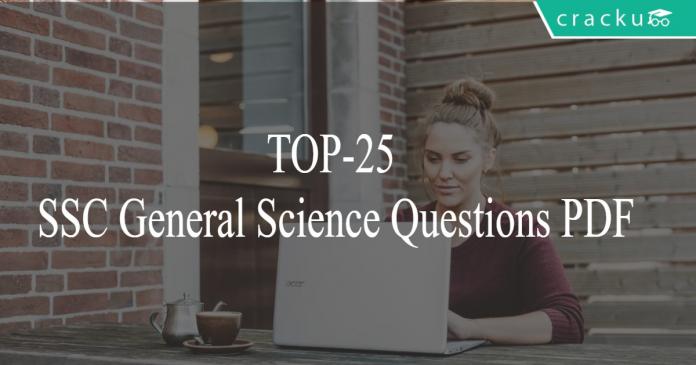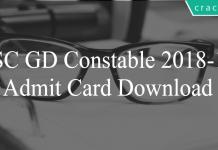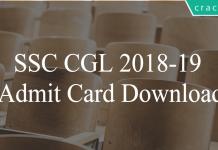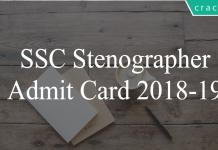TOP-25 SSC General Science Questions PDF:
Download TOP-25 SSC General Science Questions and Answers PDF. These questions will be very useful for SSC exams of CGL, CHSL, MTS, CPO, GD and Stenographer.
Download TOP-25 SSC General Science Questions PDF
Download All SSC CGL Important Questions PDF
Read this Post in Hindi
Question 1: Anopheles mosquito comes under which phylum?
a) Echinodermata
b) Porifera
c) Arthropoda
d) Mollusca
Question 2: Which microorganism causes the disease diphtheria?
a) Bacteria
b) Virus
c) Fungi
d) Protozoa
Question 3: In which part of the body does the protein digestion begin?
a) Oesophagus
b) Mouth
c) Small intestine
d) Stomach
Question 4: Who is the first person to distinguish blood groups?
a) Gerhard Domagk
b) Philip Levine
c) Karl Landsteiner
d) Jules Bordet
SSC CGL Previous Papers Download PDF
Question 5: What is the name of the wall separating left and right half of the heart?
a) Septum
b) Sternum
c) Auricle
d) Aorta
Question 6: What is the diastolic pressure of heart?
a) 50mm Hg
b) 120mm Hg
c) 100mm Hg
d) 80mm Hg
Question 7: Lenticels are present in which part of the plant?
a) Leaves
b) Stem
c) Fruits
d) Root
Question 8: What is the end product of anaerobic respiration in humans?
a) Lactic acid
b) Ethanol
c) Water
d) Maleic acid
Question 9: Which organism undergoes the process of multiple fission?
a) Paramecium
b) Hydra
c) Yeast
d) Plasmodium
Question 10: Which is the female reproductive part of the plant?
a) Anther
b) Carpel
c) Filament
d) Stamen
Question 11: Which plant hormone controls the response of plant to gravity?
a) Abscisic acid
b) Cytokinin
c) Gibberellin
d) Auxin
Question 12: Which anticoagulant prevents clot within blood cells?
a) Trypsin
b) Heparin
c) Fibrinogen
d) Ascorbic acid
Question 13: In which cell are the centrosomes present?
a) Animal cell
b) Plant cell
c) Both a & b
d) None of the above
Question 14: Who is the first person to coin the word “biology”?
a) Louis Pasteur
b) Jean Baptiste-de Lamarck
c) Antonie Leeunhoek
d) Robert Koch
Question 15: Which alkalis are generally used in soap making?
a) Silicon hydroxide, Ammonium hydroxide
b) Manganese hydroxide, Calcium hydroxide
c) Magnesium hydroxide, Aluminum hydroxide
d) Sodium hydroxide, Potassium hydroxide
Question 16: Expand RDX ?
a) Research & Department Explosive
b) Research & Development Engine
c) Research & Dreaded Explosive
d) Receiver & Development Explosive
Question 17: Which chemical reaction occurs at anode ?
a) Reduction
b) Oxidation
c) Redox reaction
d) None of the above
Question 18: What are the molecules having same number of atoms and valence electrons called?
a) Isotones
b) Isotopes
c) Isobars
d) Isosters
Question 19: Efflorescence is observed in which type of chemicals?
a) Amphoteric substances
b) Bases
c) Salts
d) Acids
Question 20: Which chemical does the term “alcohol” refer to in alcoholic beverages?
a) Butane
b) Methyl alcohol
c) Ethanol
d) Propanol
18000+ Questions – Free SSC Study Material
Question 21: Which hydrocarbons donot have odour?
a) Aromatic hydrocarbons
b) Aliphatic hydrocarbons
c) Benzene
d) Arenes
Question 22: Which organic compounds have -CHO as functional group?
a) Aldehydes
b) Ketones
c) Esters
d) Carboxylic acid
Question 23: Which sign convention is used to measure the distances in the ray diagrams of spherical mirrors?
a) Francis sign convention
b) Locke sign convention
c) Kant sign convention
d) Cartesian sign convention
Question 24: How many fundamental forces of nature are there?
a) Four
b) Three
c) Five
d) Two
Question 25: In the Fleming’s left hand rule, while forefinger, middle finger and thumb are stretched in right angles to each other. What does the forefinger represent?
a) Direction of force
b) Direction of magnetic field
c) Direction of current
d) Direction of power
Answers & Solutions:
1) Answer (C)
2) Answer (A)
3) Answer (D)
4) Answer (C)
5) Answer (A)
6) Answer (D)
7) Answer (B)
8) Answer (A)
9) Answer (D)
10) Answer (B)
11) Answer (D)
12) Answer (B)
13) Answer (A)
14) Answer (B)
15) Answer (D)
16) Answer (A)
17) Answer (B)
18) Answer (D)
19) Answer (C)
20) Answer (C)
21) Answer (B)
22) Answer (A)
23) Answer (D)
24) Answer (A)
25) Answer (B)





